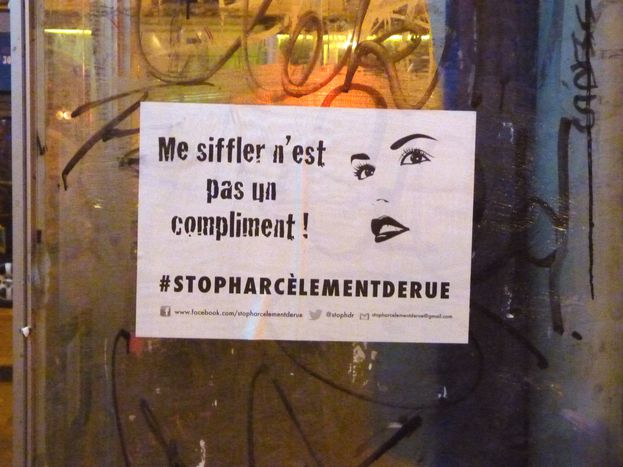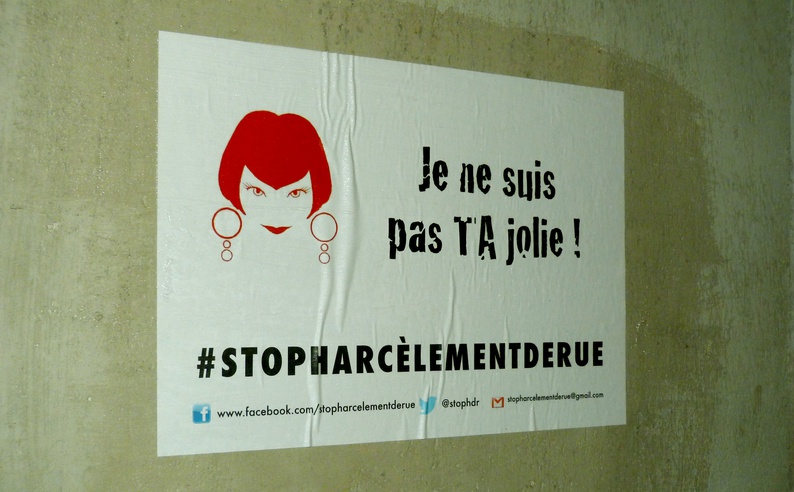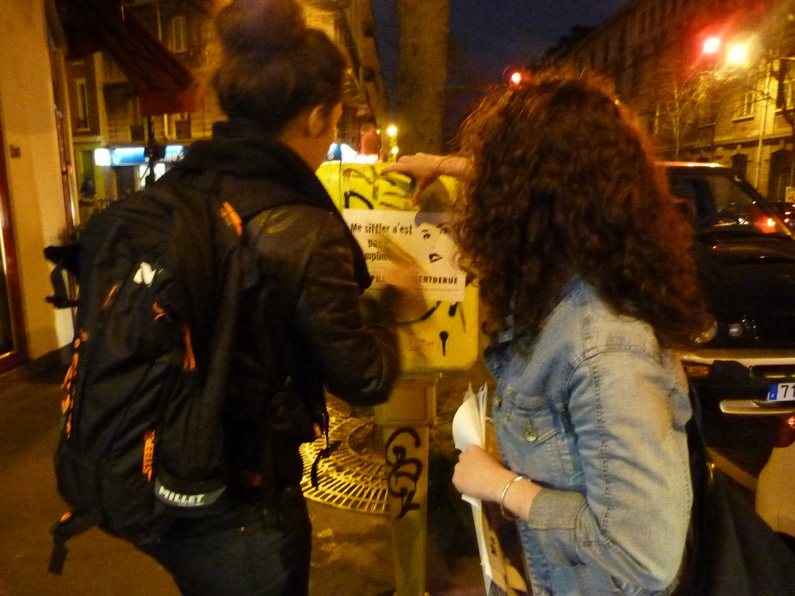
“Jerk-free zones” fighting street harassment.
Published on
Translation by:
Sara L PullinSick and tired of being whistled at or receiving unwanted compliments in the street, these girls took things into their own hands and created Stop Street Harassment, a community group that gathers together girls and guys in the fight against “jerks”. Their goal? To create “jerk-free zones” in bars and festivals, but also more importantly, on the street. A four-person interview.
After their first campaign action on the 8th March for International Women’s Day and another on the 4th June in Rue Jean-Pierre Timbaud (11th arrondissement of Paris), the community group Stop Street Harassment came together on Thursday 10th April to consider their latest actions. With twenty-odd people present at the time, the assembly decided to adopt “Jerk-free zones” as the campaign name. Heloise, Delphine, Cecile and Stephanie talk about their aims and their vision for harassment-free streets.
 cafébabel: How do you react when faced with “jerks” that harass you?
cafébabel: How do you react when faced with “jerks” that harass you?
Cécile: That depends. Sometimes I turn it into a learning experience explaining to the guy that this isn’t the way to succeed in seducing a girl. But the last time I didn’t know what to reply. I was with my baby and some guy asked me if he had a father. Even at 8 months pregnant I was approached, they really have no limits!
Heloise: It’s just because you’re a girl. We all have our personal reaction mechanisms but I don’t know what works best!
Stéphanie: Me, I always go straight for aggressiveness. Before I ignored the comments, but I haven’t worn a skirt for two years.
Delphine: I play the good buddy. When they ask me if I had a good night, I ask them how theirs was. I abandon the “thankyous” and other polite words, in other words, I go totally for desexualisation.
cafébabel: Where did the idea for the community group come from?
Héloïse: Daniele and I were discussing how we feel we can’t relate to the feminist movement. We wanted to do something concrete that would address a large population but that would be outside of the perpetual feminist debates. We started off with a mobile application and then we launched the group on Facebook and Twitter on the 23rd February. Several people joined us and we were able to put up our first posters in Paris on the 8th March. They read “I’m not your pretty thing”, “My skirt doesn’t mean yes” and “Whistling at me is not a compliment”. After that there was an opinion piece in the Liberation the 2nd Avril and a new protest on the 4th April. We went into the bars on Rue Jean Pierre Timbaud and asked them if they would allow us to put up our posters. 8 accepted, as well as 12 others in the Bastille.
cafébabel: What is your goal?
Delphine: We want to make it understood that an unwanted compliment, already counts as harassment.
Héloïse: And that wolf-whistling isn’t a compliment! We want the discourse of denunciation that is common on the internet, like on the blog Paye ta shnek (a blog where women post comments said to them in the street), to appear at street level. The aim is for female clients to no longer be pestered in bars and also that they can speak out about it if necessary. These places should serve as examples to show that a “jerk-free zone” is possible!
Cécile: Even if we have feminine attributes, we are not vacant sexual objects. There is a sense of goodwill that is absent when a guy throws a compliment at you in the street or if he hits on your incessantly, as if you were a piece of meat!
Stéphanie: We would love to totally eradicate street harassment, but it’s so widespread that firstly we just want to reduce it. The real goal would be to have both men and women reacting when they are confronted with this type of harassment.
 cafébabel: What are your next campaign actions?
cafébabel: What are your next campaign actions?
Delphine: We would like the bars to really get involved. For the moment, they just make it known that they sympathise. But the next step is to make materials and posters available to create awareness in bar owners and their staff. We are also thinking about having “jerk-free zones” in festivals as well as on public transport, in places where harassment is frequent.
cafébabel: Why did you firstly target bars?
Cécile: They were the easiest representatives to approach and they offer good visibility because both the aggressor and the aggressed are often found in these places.
Delphine: It’s also a passage towards the street, a place to reclaim. A lot of women don’t go out alone because they have integrated the idea that it is dangerous for them.
cafébabel: How do women react when you speak to the about the community?
Delphine: At our reunion, lots of them said that they had become conscious of the magnitude of this phenomenon after having gone overseas or to regional provinces.
Cécile: A lot of women also said that they feel alienated by this type of behaviour and that they changed the way they dressed because of remarks that were made to them.
Stéphanie: Some of them thanked us for having opened up the dialogue on the subject because they didn’t know what to do.
Cécile: In general they are super responsive! All of us have met a jerk at least once!
Translated from Des « zones sans relou » contre le harcèlement de rue



